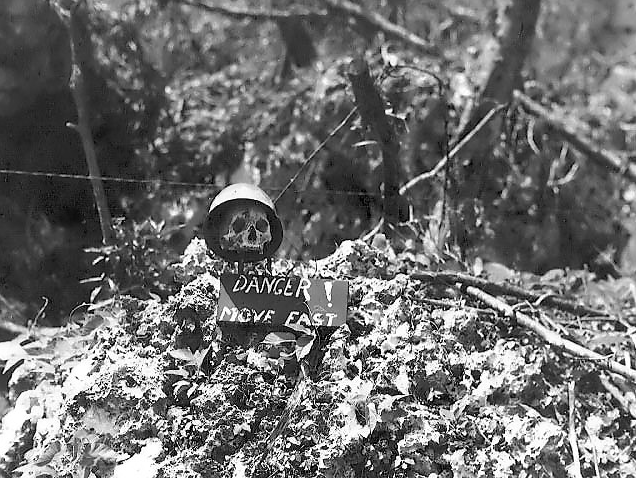A front-line warning sign on Peleliu during World War II.
By Chris Hunt
My grandfather was an old man the last time we fished together on Robinson Creek, not far from where it leaves the boundary of Yellowstone National Park and flows into Idaho at the depths of a thigh-busting canyon.
We’d walked in from a little access road—a friendlier avenue for an octogenarian armed with a supple 3-weight fly rod and a giddy grin. It had been a while since he’d fished a small stream, and while he wasn’t going at it head-on like he might have in his younger days, he did throw some good casts at some pretty nice trout that day. I think he was happiest when he was fishing, and I think he was happier still when one of his grandsons walked by his side.
We stopped fishing when we reached the boundary of the park—he didn’t have a Yellowstone license, and the terrain gets a little tricky that high up. But we did walk up a ways, into the park, where we sat on a log and just talked.
I honestly don’t know if my grandfather had ever been to the park, or if he’d ever cruised the Grand Loop Road or watched Old Faithful blow her top. But there we sat, that sunny, early September day, on a fallen log within the backcountry boundary of Yellowstone, eating a bologna sandwich and watching the creek flow by.
My grandfather was a corporal in the U.S. Marine Corps—he served in World War II, and survived some of the most horrific battles in the South Pacific Theater. He trudged through Guadalcanal and New Britain, and survived what the U.S. Marine Corps Museum calls the “bitterest battle of the war of for the Marines” at Peleliu.
And until that day, he never talked about it.
As kids, we lacked any real subtlety when it came to the war and our grandfather’s involvement in it. We asked brazenly if he’d ever killed anyone. We asked, without sensitivity, what it was like to be in combat. He never responded to such queries—he would only say that he got his bald spot atop his head from a Japanese cannon shell.
That day, as we talked, I realized that we were having a real, honest-to-God grown-up conversation. As Robinson Creek flowed by, fresh from a dive off the Pitchstone Plateau, and on its way to meet the Warm River and then the Henry’s Fork, he spoke for the first time of the horrors he’d experienced some 60 years earlier on a spit of coral in the Palau Islands that McArthur said he needed as an airstrip to defend his flank in the efforts to retake the Philippines. Peleliu is one of the war’s most controversial battles—in all, there were 9,800 casualties among U.S. Marines and soldiers (1,800 died there)—because many believe it was an unnecessary task.
My grandfather never questioned the necessity—or lack thereof—of the two months spent trying to take the small atoll. But he did speak reverently about the violence he witnessed, endured and inflicted between September and November 1944. I remember these words he uttered, because they are burned on my brain:
“I hope your kids never have to experience that. My life changed there. Forever.”
It’s Memorial Day Weekend, and I’m headed to Yellowstone, the last place my grandfather and I ever spent a day together on the water. He’s on my mind a lot when I fish—he instilled in me the love for fishing and for the untamed places where wild trout swim. And though he’s been gone for more than a decade, he’ll be there with me this weekend, casting to browns and rainbows on the Firehole.
I’ll remember him and the sacrifices he and so many others made—particularly those who fought and died on Peleliu—as I cast to the fish he loved so dearly.
It’s a fitting way to remember my hero. I hope you honor someone this weekend, too.
Chris Hunt is the national editorial director for Trout Media. He lives and works in Idaho Falls.



